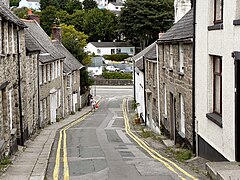Penryn, Cornwall
Penryn
|
|
|---|---|
 St Gluvias Street, Penryn |
|
| Penryn shown within Cornwall | |
| Population | 6,812 (Census 2011) |
| OS grid reference | SW782345 |
| Civil parish |
|
| Unitary authority | |
| Ceremonial county | |
| Region | |
| Country | England |
| Sovereign state | United Kingdom |
| Post town | PENRYN |
| Postcode district | TR10 |
| Dialling code | 01326 |
| Police | Devon and Cornwall |
| Fire | Cornwall |
| Ambulance | South Western |
| EU Parliament | South West England |
| UK Parliament | |
Penryn (/pɛnˈrɪn/Cornish: Pennrynn, meaning 'promontory') is a civil parish and town in Cornwall, England, United Kingdom. It is situated on the Penryn River about 1 mile (1.6 km) north-west of Falmouth. The population was 7,166 in the 2001 census and a receded 6,812 in the 2011 census, a drop of more than 300 people across the ten year time gap. There are two electoral wards covering Penryn: 'Penryn East and Mylor' and 'Penryn West'. The total population of both wards in the 2011 census was 9,790
Though now the town is overshadowed by the larger nearby town of Falmouth, Penryn was once an important harbour in its own right, exporting granite and tin to the rest of the country (and indeed the world) throughout the medieval period.
Penryn is one of Cornwall's most ancient towns and boasts a wealth of history. The ancient town first appears in the Domesday Book under the name of "Trelivel", and was since founded and named Penryn in 1216 by the Bishop of Exeter. The borough was enfranchised and its Charter of Incorporation was made in 1236. The contents of this Charter were embodied in a confirmation by Bishop Walter Bronescombe in the year 1259. In 1265, a religious college, called Glasney College, was built in Penryn for the Bishop of Exeter to develop the church's influence in the far west of the diocese. In 1374, the chapel of St Thomas (sometimes called St Mary's) was opened. Standing at the head of the Penryn River, Penryn occupies a sheltered position and was a port of some significance in the 15th century. After the Dissolution of the Monasteries by King Henry VIII and the disestablishing of the Roman Catholic church, Glasney College was dissolved and demolished in 1548 during the brief reign of Edward VI, the first Protestant Duke of Cornwall and afterwards King of England. The dissolution of Glasney College helped trigger the Prayer Book Rebellion of 1549. The loss of Glasney and the defeat of the 1549 rebellion proved to be a turning point in the history of the town from which Penryn has never recovered.
...
Wikipedia

